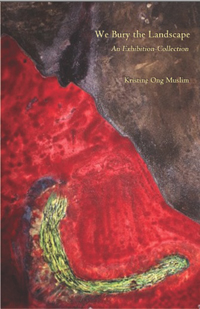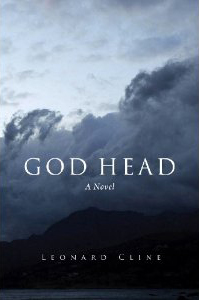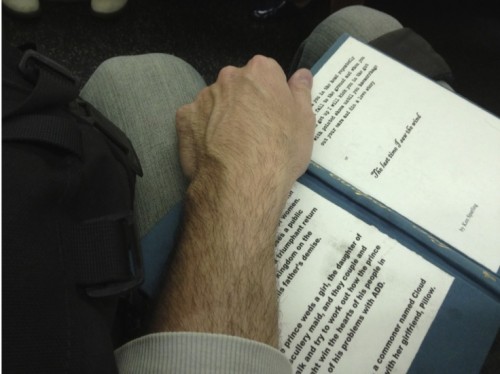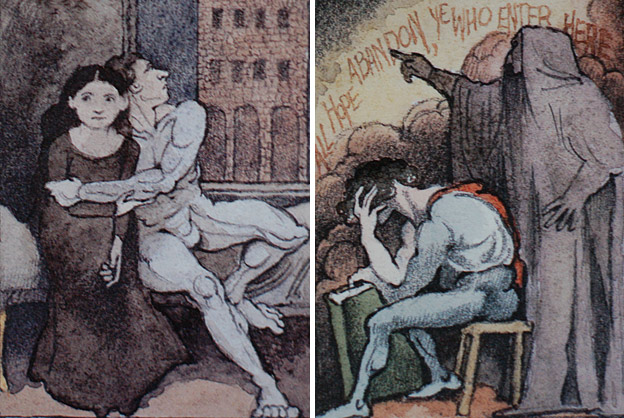Ken Sparling’s The Serial Library: Overview and Interview
[Guest Post: Greg Gerke]
Ken Sparling is a writer. He works in a library in Toronto. He has written six novels. His latest is Intention, Implication, Wind from Pedlar Press. His first, Dad Says He Saw You at the Mall, published by Knopf in 1996 will be reissued by Mud Luscious Press in August.
Kevin Na on Writing
It was a little fishy because there was a water bottle next to my ball. That was a little fishy there. But whatever.
I don’t know where I’m going, I swear to God.
His shadow was in the way.
I can’t blame my whole year on one week. It was a pretty rotten year all around.
Just bear with me.
Snoop Dogg is my neighbor.
And I’m not being nice to myself, trust me. I’m ripping myself. As ugly as it is and painful as it is, believe me, it’s really tough for me, and I’m trying.
It was a pretty big tree, and I asked for any volunteers to climb up the tree, but nobody spoke up.
There’s this timing, and if I miss that timing, then I have to start over.
As crazy as it sounds, I really don’t know.
The rest you saw. I don’t really want to go through it again.
It hit me in the inner thigh.
I’m going to try to take out the whole waggle, no waggle.
Honestly, it’s going to be a battle.
We Bury the Landscape
 We Bury the Landscape
We Bury the Landscape
by Kristine Ong Muslim
Queen’s Ferry Press, April 2012
168 pages / $12.95 Buy from Queen’s Ferry Press or Amazon
If for one minute, I got lost in the galleries of Kristine Ong Muslim’s mind, I don’t know if I’d ever be able to leave. We Bury the Landscape is a collection of one-hundred ekphrastic works of flash fiction and prose poetry pieces that act as glimpses— better yet— conduits, into parallel universes constructed and inspired by a surreal, but brilliant, forge of one-hundred unique paintings. Visceral is a word that gets overused. But in this case, the text leaps off the pages, claws it ways onto your bones, gnaws and tears and embeds itself inside the cavities of your brain. Many of the stories are short and can be quickly read, but each of them lingers hauntingly as in, “The Taxidermist and the Girl Made of Dead Things:”
May 14th, 2012 / 12:30 pm
Another way to generate text #1: “The Spell Check Technique”
[Update 26 June 2012: At my personal blog, I’ve put up another demonstration of this technique.]
When I was younger and wanted to write but was less sure of my own inspiration, I liked inventing processes that would generate text for me. The most useful technique I devised was something I called “the Spell Check Technique.” These days I don’t really use it anymore, so I thought I’d set it down here in case others would like to pick it up.
For this technique you need a text editor with spell check capacity (I’ll demonstrate it using Microsoft Word 2003), plus some text. It doesn’t really matter what the text is.
Let’s start with a good chunk of lorem ipsum (generated through this website). (Note that you can use any starting text you like; I’m using lorem ipsum just for this example.)
a howling bird brings all the cats to yr yard
well) here’s looking at ourselves
two solids in(all
one it)
solution(of course you must shake well)
indolently dreaming puzzling
over that one
oh just thinking it over
(at that just supposing
we had met and just
but you know
supposing we READ MORE >
Columbia University Press Sale Recommendations

Save 50% on ALL titles during our special Spring sale!
Click through for 16 recommendations you might want to consider…
Nothing is True, Everything is Permitted
But these operations do not occur in neutral territory, Kaye was quick to point out. Burroughs treats all conditions of existence as results of cosmic conflicts between competing intelligence agencies. In making themselves real, entities (must) also manufacture realities for themselves: realities whose potency often depends upon the stupefaction, subjugation and enslavement of populations, and whose existence is in conflict with other ‘reality programs’. Burroughs’s fiction deliberately renounces the status of plausible representation in order to operate directly upon this plane of magical war. Where realism merely reproduces the currently dominant reality program from inside, never identifying the existence of the program as such, Burroughs seeks to get outside the control codes in order to dismantle and rearrange them. Every act of writing is a sorcerous operation, a partisan action in a war where multitudes of factual events are guided by the powers of illusion … (WV 253-4). Even representative realism participates – albeit unknowingly – in magical war, collaborating with the dominant control system by implicitly endorsing its claim to be the only possible reality.
From the controllers’ point of view, Kaye said, ‘it is of course imperative that Burroughs is thought of as merely a writer of fiction. That’s why they have gone to such lengths to sideline him into a ghetto of literary experimentation.’
God Head
 God Head
God Head
by Leonard Cline
Northern Illinois University Press, May 15 2012
168 pages / $16 Buy from Amazon or University of Chicago Press Books
This month, Northern Illinois University Press will release its republication of Leonard Cline’s God Head. First published in 1925, Cline’s debut work was received by enormous critical acclaim.
“Leonard Cline could write rings around a half dozen of our ten best novelists,” proclaimed the New York World. “When a new novelist, who is really good shines forth, we are supposed to be first to review or, as you might say, revere him. Well, Cline is such a new novelist,” affirmed the New Yorker.
Given his substantial literary merits, one wonders what had to happen to Cline to prevent him from achieving the iconic literary status of a Fitzgerald or a Hemingway. As it turns out, a lot happened. Two years after the publication of God Head, Cline was convicted of manslaughter for shooting a good friend while drunk. Two years after that he died of heart failure. He was thirty-six.
May 11th, 2012 / 12:00 pm



